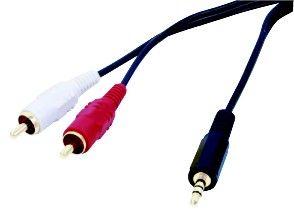
How do i connect my sony Audio system to the pc
Started by
prasharry2k5
, Mar 05 2006 02:00 PM
#1

 Posted 05 March 2006 - 02:00 PM
Posted 05 March 2006 - 02:00 PM

#2

 Posted 05 March 2006 - 03:11 PM
Posted 05 March 2006 - 03:11 PM

Hi there
It depends on what it is you're trying to do. Are you trying to play audio from the PC through the amp & stereo speakers?
It depends on what it is you're trying to do. Are you trying to play audio from the PC through the amp & stereo speakers?
#3

 Posted 06 March 2006 - 02:01 AM
Posted 06 March 2006 - 02:01 AM

i want to know both.
1. How to connect only speakers
2. How to connect amp (including speakers)
1. How to connect only speakers
2. How to connect amp (including speakers)
#4

 Posted 06 March 2006 - 06:12 PM
Posted 06 March 2006 - 06:12 PM

To connect the PC to an amplifier (with the speakers attached to the amp), you need a mini jack to 2 phono (male) lead, like the one in the picture below :

The mini-jack plug connects to the line out socket on your sound card, the twin phono plugs connect to the AUX port (or CD or Tuner port) on the rear of your amplifier.
You cannot connect your stereo speakers directly to the computer because they are (I assume) non-powered & the computer requires an amplifier of some description in order to make the sound audible. This is why computer speakers have built in amps.

The mini-jack plug connects to the line out socket on your sound card, the twin phono plugs connect to the AUX port (or CD or Tuner port) on the rear of your amplifier.
You cannot connect your stereo speakers directly to the computer because they are (I assume) non-powered & the computer requires an amplifier of some description in order to make the sound audible. This is why computer speakers have built in amps.
#5

 Posted 07 March 2006 - 09:43 PM
Posted 07 March 2006 - 09:43 PM

thanx a lot brother for your gr8 advice. Got the connector and it works all fine.
#6

 Posted 09 March 2006 - 02:49 PM
Posted 09 March 2006 - 02:49 PM

Great, glad you've got it working. I've got same setup myself at home, with my PC connected to a 360W amplifier & a SCSI 5 disc CD changer in the computer.
In case you haven't worked this out, you can also connect that cable directly to the headphone socket on the front of your CD/DVD drive in the PC, instead of the sound card's line out socket. This way you can play music CDs through the amp & speakers but without all the Windows sounds (such as the startup jingle etc) being piped at loud volume through the same system!
In case you haven't worked this out, you can also connect that cable directly to the headphone socket on the front of your CD/DVD drive in the PC, instead of the sound card's line out socket. This way you can play music CDs through the amp & speakers but without all the Windows sounds (such as the startup jingle etc) being piped at loud volume through the same system!
#7

 Posted 09 March 2006 - 09:31 PM
Posted 09 March 2006 - 09:31 PM

thanx man but now my problem is i do not have the connection cord long enough to connect them. I have to move the whole case whenever i have to connect.  (. But atleast i got it connected. if you how to extend it plz do tell me
(. But atleast i got it connected. if you how to extend it plz do tell me
#8

 Posted 10 March 2006 - 10:12 PM
Posted 10 March 2006 - 10:12 PM

If you can't find a long enough cable then simply buy a normal phono cable (2 x phono [male] on both ends) of the right length. These are easier to find because they are the ones used normally for connecting stereo components together.
Then all you need is a twin phono coupler (see pic below) to join the two cables together

Alternatively, if you can find one long enough, just buy a phono cable which has 2 x phono [male] on one end & 2 x phono [female] on the other. This way you won't need the coupler.
Then all you need is a twin phono coupler (see pic below) to join the two cables together

Alternatively, if you can find one long enough, just buy a phono cable which has 2 x phono [male] on one end & 2 x phono [female] on the other. This way you won't need the coupler.
#9

 Posted 12 March 2006 - 01:14 PM
Posted 12 March 2006 - 01:14 PM

thanx a lot ill look into it and see what i can do. Thanx a million.
#10

 Posted 12 March 2006 - 01:25 PM
Posted 12 March 2006 - 01:25 PM

You're welcome. Let me know how you get on
Similar Topics
0 user(s) are reading this topic
0 members, 0 guests, 0 anonymous users
As Featured On:














 Sign In
Sign In Create Account
Create Account

